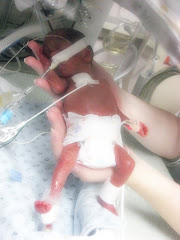Please help Ryan and I keep Olivia safe once she comes home! We ask for your patience and understanding.
Top 10 Ways to Keep Your Preemie Healthy This Winter
The onset of cold and flu season can be a nervous time for the parents of premature infants. We all want to keep our preemies healthy and avoid a possible hospital admission due to infection. While there are no guarantees, by following some simple tips we can keep our preemies healthy throughout the winter months.
1) Hand washing. Hand washing, Hand washing! Hand washing cannot be emphasized enough. It is the single best way to avoid the spread of disease. Every single person who touches a preemie (or any baby) should first wash their hands. This includes friends, family, siblings, healthcare workers, and even parents. The CDC recommends the following technique for hand washing:
* First wet your hands and apply liquid or clean bar soap. Place the bar soap on a rack and allow it to drain.
* Next, rub your hands vigorously together and scrub all surfaces.
* Continue for 10 - 15 seconds or about the length of a little tune. It is the soap combined with the scrubbing action that helps dislodge and remove germs.
2) Stay away from sick people. This may seem obvious, but do not let sick people visit and do not visit them with your preemie.
3) Avoid crowds. The grocery store and malls are full of people and germs this time of year. Even churches and synagogues can be a hazard, especially because everyone will want to admire your preemie up close. If you have to go out with your preemie pick a time of day when there will be minimal exposure to crowds and do not be afraid to ask people to step back.
4) Hand Sanitizer. Recent studies have shown that the proper use of hand sanitizer can decrease the transmission of disease in the home. It comes in large containers for home use and travel size bottles that fit right into the diaper bag. It is a great option when there is no sink available or when you have the baby on the changing table.
5) Smart scheduling. When making doctors appointments ask for the first appointment of the day or the first appointment after lunch. This decreases the risk of exposure to other children in the office. Most offices will be happy to accommodate preemies any way they can and will put them into exam rooms right away instead of leaving them in waiting rooms if the parents ask.
6) RSV and Flu preventatives. RSV is a virus that presents as nothing more than a cold in most children, but it can be a very serious for children at risk including many preemies. Ninety percent of the the population is exposed to RSV before they reach two years old, which means it is very likely that your preemie will be exposed to RSV at some point. The drug Synagis is given as a monthly injection to protect against RSV. Synagis decreases the severity of RSV but it does not totally prevent children from contractiong RSV. The flu is also a very serious illness in young children. The fllu vaccine should be given to all children under the age of two but older children with chronic health issues may also qualify. Check with your pediatrician to see if your child qualifies for Synagis and/or the flu vaccine.
7) Be the gatekeeper for your child. One of the most important responsibilities any parent has is to be the gatekeeper for their child. This is especially true for preemies. Do not feel bad telling well meaning strangers that they cannot touch your child. Let family and friends know that they cannot come iinto your home with so much as a sniffle and do not feel guilty about not visiting an elderly relative in the nursing home with your preemie. These strict guidelines can be hard for some people to accept, so just remember to blame the doctors and nurses. “The doctor told me I can't to X with the baby,” can take the pressure off you as the parent. Your child's healthcare providers are happy to take the blame in order to keep your child healthy.
8) No smoking. Smoking has been shown to increase the risk of RSV and other respiratory illness in preemies. Yet another good reason to quit and to ban smoking in your home.
9) Limit Exposure from older siblings. If there are older siblings in school it is important to teach them how to prevent the spread of infection. Some parents may choose to keep preschoolers home from school during the winter months, but this is not necessary in every case. Emphasizing hand washing and limiting close contact as much as possible, especially if the sibling is sick, are the best ways to keep older siblings form spreading illness to your preemie.
10) Stay Healthy. As a primary caregiver you need to stay healthy for yourself and your preemie. Aside from frequent hand washing, you also should avoid touching your eyes, nose and face. Illness can also be avoided by practicing good health habits such as getting enough rest, eating nutritious foods and staying physically active. Although this may be difficult for anyone with children, it is important to try to do these things.
Lastly, if you do happen to get sick try to stay away from your preemie and let another caregiver take over until you are no longer contagious.


+copy.jpg)

1 comment:
I second that motion!!
Kerry
Post a Comment